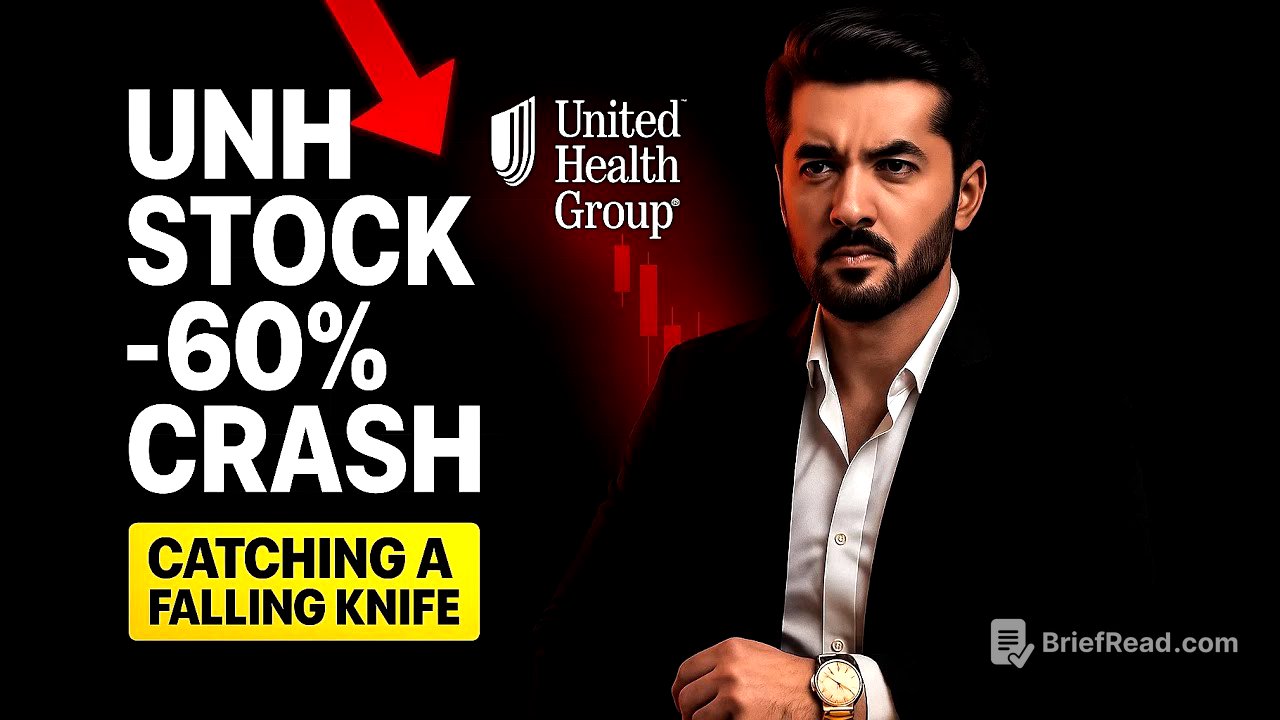TLDR;
The video discusses UnitedHealth Group (UNH) stock, which has experienced a significant drop of 58% in the last four months. The presenter explains why he bought the stock, citing its high quality, strong market position, and current undervaluation. He emphasizes the company's solid financials, consistent revenue growth, and history of share buybacks and dividend payments, which provide a floor to the stock price. The presenter also notes the involvement of several prominent investors in UNH, further supporting his investment decision.
- UNH stock has dropped 58% in the last four months, creating a buying opportunity.
- The company has strong financials, consistent revenue growth, and a history of share buybacks and dividend payments.
- Several prominent investors are involved in UNH, indicating confidence in the company's long-term prospects.
Introduction to UNH Stock's Recent Decline [0:00]
UNH stock has fallen significantly this year, dropping 58% in the last four months. The stock price, which was around $600 per share in early April and close to its all-time high of $615, has experienced a severe and rapid decline. This sharp downswing has caught the attention of the presenter, who views it as a potential buying opportunity, especially considering the company's high quality and leadership in its sector.
Rationale for Investing in a "Falling Knife" [0:45]
The presenter expresses excitement about the opportunity to invest in UNH, describing it as a "falling knife" situation. He clarifies that while UNH is classified under the healthcare sector, its primary business is insurance, making it more closely related to finance. He has been following the company for over five years and considers it easier to understand than banks, which are outside his investment focus. The presence of super investors like Viking Global, Polen Capital Management, and Dodge & Cox, along with David Tepper's long-term investment since 2017, reinforces his confidence in the stock.
Industry Comparison and Margin Analysis [3:15]
Comparing UNH to its competitors in the healthcare plans industry reveals that UNH is a clear winner in terms of margins. UNH has gross margins of 20%, an operating margin of 4%, and a profit margin of 5%, which are significantly better than companies like CVS, Cigna, and Humana. UNH also leads in free cash flow (FCF) margin at 6% and return on invested capital (ROIC) at 15%. The PE ratio is currently at 10, and the FCF yield is at 11%, indicating that it is trading at a discount compared to its historical premium.
Defensive Stock Characteristics and Dividend [5:39]
UNH pays a dividend of over 3%, making it a defensive stock in the presenter's portfolio. Similar to his investments in Novo Nordisk and PepsiCo, he prefers defensive stocks when the S&P 500 is at all-time highs. The presenter acknowledges the stock's price action as a "falling knife" but intends to hold it for several years, believing it will outperform the S&P 500.
Revenue Growth and Shares Outstanding [7:11]
UNH has shown consistent growth in premiums and annuity revenue, with total revenue increasing from around $40 billion per quarter ten years ago to over $100 billion per quarter. The presenter is pleased to see this revenue growth, even stating he would be happy buying the stock at a 60% discount even if the revenue was flatlining. The company has also been buying back its stock, reducing the number of shares outstanding over time, which provides a solid floor to the share price.
Margin Comparison and Balance Sheet Analysis [10:30]
The presenter emphasizes the importance of comparing UNH's margins to its competitors within the healthcare insurance segment, rather than to companies in other sectors with inherently higher margins. UNH has $28 billion in cash and cash equivalents, an all-time high, representing over 10% of its $230 billion market cap. This strong cash position reduces bankruptcy risk and allows for accelerated buybacks.
Debt and Stock-Based Compensation [12:30]
Shareholders' equity has been increasing over time, and net debt has decreased as the company has been paying it down. Stock-based compensation is reasonable and not excessive compared to net income and revenue. The company's repurchases of common stock have been increasing, reaching over $11 billion in the trailing 12 months, which further supports the share price.
Floor to Share Price and Valuation [15:02]
The presenter believes that UNH's buybacks, dividends, cash on hand, and profitability provide a strong floor to the share price, preventing it from crashing like overvalued bubble stocks such as ZoomInfo. While the balance sheet is not pristine due to the nature of the insurance business, the $50 billion in debt is not a major concern, especially compared to other companies with high debt and low market caps. The price-to-sales ratio is 0.5%, and the forward PE ratio is 15.
Investment Rationale and Key Metrics [17:31]
The presenter sees the current situation as a great opportunity to buy UNH at a discount due to fear among institutions. The EV to EBITDA ratio is at its lowest in the last 10 years, and the return on equity is 20%. The return on capital invested is over 10%, and the FCF yield is at an extreme level of 11%. The dividend payout ratio is around 37%, indicating a solid and reliable dividend.
Peter Lynch Quote and Investment Strategy [21:02]
Referencing Peter Lynch's quote, "Things never clear until too late," the presenter explains that the current uncertainty and bad news surrounding UNH create a buying opportunity. He finds the situation attractive because UNH, a high-quality company he has been watching for years, is now trading at a bargain price. He plans to continue buying the stock, potentially making it a significant portion of his portfolio.
Super Investor Involvement and Conclusion [23:24]
The presenter highlights the involvement of numerous super investors and hedge fund managers in UNH, many of whom have held the stock for several years. Dodge & Cox, for example, added 117% to their position in the last quarter. He believes that these investors will likely be tempted to buy more shares at the current depressed prices, providing further support to the stock. The presenter concludes by stating that he will provide an update on his position in a few months, after reviewing the next 13F filings and updated financial statistics.









